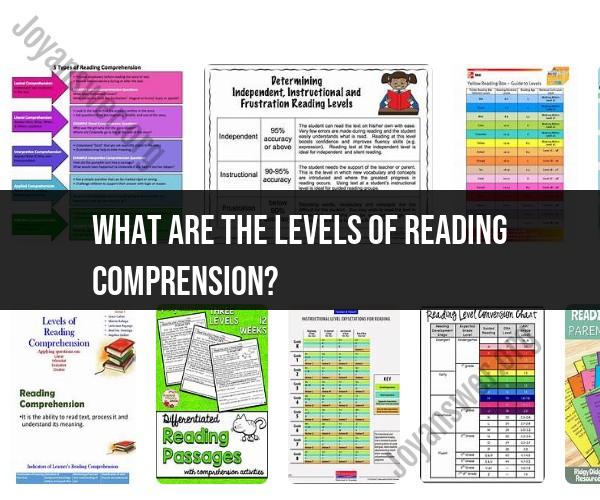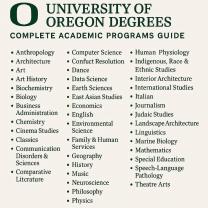What are the levels of reading comprension?
Reading comprehension is the ability to understand and interpret written text. It can be assessed and categorized into different levels of proficiency to gauge a reader's skill and understanding. The levels of reading comprehension typically include:
Literal Comprehension: At this level, readers can understand and recall explicit information directly stated in the text. They can answer factual questions about who, what, when, where, and why based on the information presented. Literal comprehension forms the foundation of reading comprehension skills.
Inferential Comprehension: Beyond literal comprehension, this level involves making inferences or drawing conclusions based on information that is implied but not explicitly stated in the text. Readers must connect the dots and use their critical thinking skills to understand the subtext and underlying meaning.
Evaluative Comprehension: At this level, readers not only understand the text but also evaluate its quality, credibility, and effectiveness. They can assess the author's argument, identify biases, and determine the strengths and weaknesses of the content.
Analytical Comprehension: Analytical comprehension involves breaking down the text into its constituent parts, such as identifying the main ideas, supporting details, and organizational structure. Readers can analyze how the author has constructed the text to convey their message.
Synthetical Comprehension: Readers at this level can synthesize information from various sources and integrate it into a coherent understanding. They can connect ideas from different texts or passages and form a comprehensive view of a topic.
Critical Comprehension: Critical comprehension goes beyond evaluation and involves a deep and critical examination of the text. Readers at this level can critique the author's arguments, identify logical fallacies, and assess the text's broader implications.
Creative Comprehension: Creative comprehension allows readers to engage with the text on a creative level. They can extrapolate from the text to imagine alternative scenarios, consider hypothetical situations, or apply the knowledge gained in creative ways.
Applied Comprehension: Applied comprehension is the highest level of reading proficiency. It involves taking the knowledge and insights gained from reading and applying them effectively in real-life situations, whether in academics, work, or personal life.
It's important to note that these levels of reading comprehension are not necessarily strict or linear. Readers may demonstrate different levels of comprehension for different texts, and proficiency can improve with practice and exposure to a variety of texts. Effective reading comprehension is an essential skill in education, professional settings, and daily life, as it enables individuals to gather information, think critically, and make informed decisions.
Levels of Reading Comprehension: A Comprehensive Guide
There are three main levels of reading comprehension: literal, inferential, and evaluative.
- Literal comprehension is the ability to understand the surface meaning of the text. This includes understanding the who, what, when, where, and why of the text.
- Inferential comprehension is the ability to go beyond the surface meaning of the text and draw conclusions. This involves using your own knowledge and experience to understand what the author is implying.
- Evaluative comprehension is the ability to judge the quality of the text and make your own judgments about the information being presented. This involves using your critical thinking skills to analyze and evaluate the text.
These three levels of comprehension are not mutually exclusive; rather, they build on each other. In order to achieve a higher level of comprehension, you must first have a solid understanding of the literal meaning of the text.
Reading Comprehension Development: Stages and Progression
Reading comprehension develops over time. There are four main stages of reading comprehension development:
- Emergent reading: This stage occurs during early childhood, when children are beginning to learn about language and literacy. Children in this stage are able to recognize simple words and phrases, and they may be able to read simple stories with the help of an adult.
- Beginning reading: This stage occurs during kindergarten and first grade. Children in this stage are able to read independently, but they may still need some help with complex words and passages.
- Proficient reading: This stage occurs during second through sixth grade. Children in this stage are able to read independently and fluently. They are also able to comprehend complex texts and multiple perspectives.
- Advanced reading: This stage occurs during seventh grade and beyond. Readers in this stage are able to read and comprehend complex texts on a variety of topics. They are also able to analyze and evaluate texts critically.
Mastering Reading Skills: Understanding the Levels of Comprehension
To master reading skills, it is important to understand the different levels of comprehension.
Literal comprehension is the foundation for all other levels of comprehension. To develop literal comprehension skills, you can:
- Pay attention to the details of the text.
- Identify the main ideas and supporting details.
- Summarize the text in your own words.
- Ask yourself questions about the text.
Inferential comprehension requires you to think beyond the surface meaning of the text and draw conclusions. To develop inferential comprehension skills, you can:
- Make predictions about what will happen next in the text.
- Identify the author's purpose and point of view.
- Draw conclusions about the characters' motivations and feelings.
- Understand the meaning of figurative language.
Evaluative comprehension requires you to judge the quality of the text and make your own judgments about the information being presented. To develop evaluative comprehension skills, you can:
- Consider the author's credentials and expertise.
- Evaluate the evidence that is presented.
- Identify any biases or prejudices in the text.
- Form your own opinion about the information being presented.
By understanding the different levels of comprehension and developing your skills in each area, you can become a more effective reader.
Here are some additional tips for mastering reading skills:
- Read regularly. The more you read, the better your comprehension skills will become.
- Challenge yourself to read different types of texts. This will help you to develop a broader understanding of the world and to become a more critical reader.
- Discuss what you read with others. This can help you to better understand the text and to develop your own interpretations.
- Don't be afraid to ask for help. If you are struggling to understand a text, ask a teacher, librarian, or friend for assistance.
Reading is a valuable skill that can benefit you in all areas of your life. By mastering reading skills, you can become a more informed and engaged citizen.












